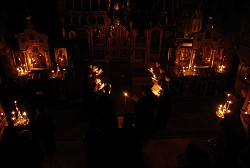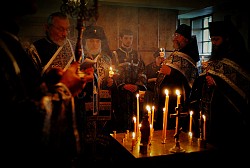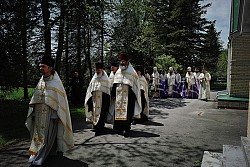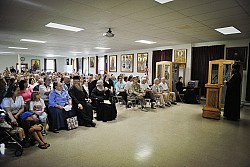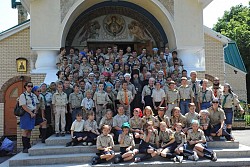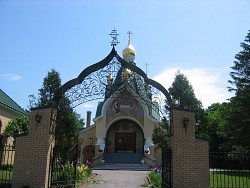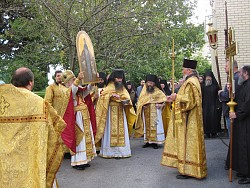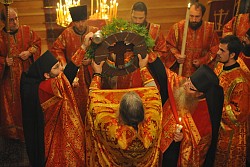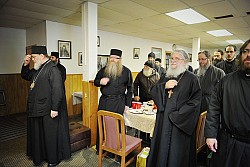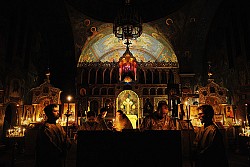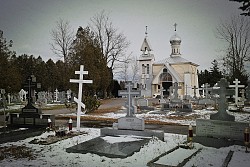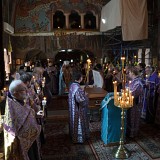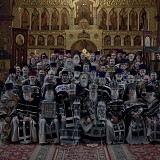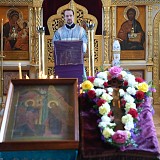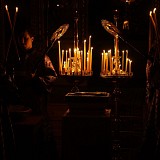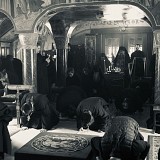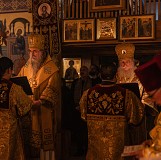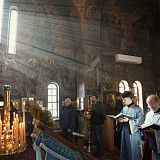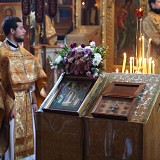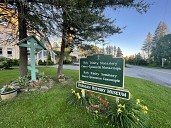00001
Glorify Him!
Today we joyfully celebrate the birth of our Savior. The Gospel story of this glorious event moves many to tears of compunction. Indeed we are moved to embrace on another our of love for God today. And even though this might be a quickly passing sentimental response it is a welcomed change in our otherwise busy life where thoughts of God are frequently crowed out by more mundane affairs.
However we should pause for a moment and give thought to the reason for this event, which forever change the course of history.
Our Lord and Savior was born to save us from the fires of hell. Surely mankind and each of us indivually for our sins could only expect to perish eternally. God’s judgment is clear in the words of our Lord, “But I will forewarn you whom you shall fear: Fear him, who after he has killed has power to cast into hell; yea, I say unto you, Fear him.” Truly our eternal fate is in God’s hands. How can we affect the scales of God’s justice?
We worship the Child-God today with warm and loving hearts. Every one of us understands and loves the heart of a child, even more so the divine heart of our Savior today. Who of us would not be horrified at the thought of crucifying a child? However this heart of the infant Christ will grow into the heart of the crucified Savior who cried in agony on the Cross, and who’s heart was pierced by a spear, precisely because of our sins. The infant Christ knows that He is born today to save us from the fires of hell by his agonizing, redeeming death. And He willingly accepts this struggle.
Of all of our sins against the Infant Christ, which will lead him to the cross, the greatest is our refusal to take advantage of His salvific struggle, from the beginning to the end of his divine life. The gift of our salvation is daily, hourly offered to us and we refuse to accept it. More than any imaginable sin this sin of refusing the gift of forgiveness, the gift that leads to eternal life and delivers us from hell fire, is the greatest.
Our Lord in His birth humbled himself completely. His step towards us is immeasurable. The greatest stumbling blocks to our salvation are our constant denial of our need for God and our excuses for not making greater efforts. We should not forget that that at the Last Judgment there will be no lawyers to offer some feeble defense for our foolishness. Our damnation will be of our own making.
Let us make that small step toward the Child-Christ today and every day and take from His infant hands the gift of salvation. There is nothing He wants more, than that we take what He offers.
Amen.
00002
00003
00004
The following day at Holy Trinity Monastery on February 5, 2012 the brotherhood served their first service in honor of the newly canonized Holy Martyr Alexander combined with the service to the Holy Blessed Xenia of St. Petersburg. May his life serve as an inspiration to us all of love for God and truth and love for our neighbor.
00005
After the Divine Liturgy a reception was held at the Seminary Hall where Archbishop Gabriel and Archimandrite Luke greeted everyone with the feast. Archbishop Gabriel shared his memories of being a student at Holy Trinity Seminary and how much he treasures those days. He advised the students to use their time here wisely and receive as much benefit as possible during their they at the Monastery. Archpriest Vladimir Tsurikov then announced various scholarships that were awarded to students. After the meal the seminary choir sung various liturgical pieces having as the theme the thief on the cross followed by a few students singing various church hymns in Byzantine chant.
May the Three Hierarchs serve as an inspiration and example to all the students.
00006
00007
00008
00009
The metrical books of the Russian Orthodox Church in London, England record that Ludwell died at his home in London at 5p.m. on March 14 O.S., 1767, having previously been confessed and received holy communion and holy unction. His funeral was served several days later in the London church. Almost 30 years earlier he had traveled from Virginia to be received at the Russian Orthodox Church in London, in 1738, several days after his twenty-second birthday.
He was blessed by the Holy Synod of the Russian Church to return to Virginia with the Holy Gifts and evidence points to the existence of a lay Orthodox community headed by him in mid-eighteenth century Williamsburg. He brought his three daughters up in the faith, and they were formally received into the Church in London in 1762. Some of their descendants also appear to have remained in the Church for several generations following Ludwell’s repose.
Apart from a few months spent in London in 1738/39 and the last seven years of his life, the rest of his days were passed in his native Virginia. Whilst there he translated into English The Liturgy of St. John Chrysostom as it is performed without a deacon and The Liturgy of St. Basil the Great as it is performed without a deacon. He also translated The Orthodox Confession of the Catholic and Apostolic Eastern Church, which was published in London in 1762, and penned what appears to be a short work of his own, entitled How to behave before, at, and after the Divine Service in the Church.
In all of these labors, he demonstrated an evident love for God and the Orthodox faith. He was also known for his cheerful and vivacious disposition, given to hospitality and to contributing to the needs of the poor. (He was the first external donor to what were to become America’s first university and first hospital in Philadelphia. )
He played a vital role in strengthening the defense of the Commonwealth of Virginia through tireless intercession with the British military authorities in his capacity as a member of the Royal Governing Council and was instrumental in obtaining the appointment of the young George Washington as a Colonel in the colonial militia. His family connections with some of the major figures of early US history are extensive: his wife was the cousin of Martha Washington and amongst his nephews there are two signers of the Declaration of Independence and the twelfth President of the Continental Congress. President’s William Henry Harrison and Benjamin Harrison were blood relatives of Ludwell and he is the great uncle of the famous American civil war General Robert E Lee. The future President Thomas Jefferson was amongst the executors of his estate and Benjamin Franklin house was a few doors down the street from Ludwell’s London home at the time of his death.
The Psalm reader at the London church at the time of Ludwell’s repose was the future Fr. Andrew Samborskii. He was to marry an English orphan girl, Elizabeth Fielding and used the catechism Ludwell translated to instruct his future wife in the Faith. After serving the church in London as Psalm reader and priest, Samborskii returned to Russia and became tutor in religion to the Grand Duke’s Alexander and Constantine, sons of Tsar Paul I. John Paradise, son in law of Philip Ludwell, also worked for the Russian imperial family as an agent for Catherine the Great in preventing a war between England and Russia.
Further information about Ludwell and his family may be found here http://orthodoxhistory.org/page/2/?s=ludwell
May Colonel Philip Ludwell’s memory be eternal!
00010
When they reached the front of the ambon the Abbot signaled them to get up and read the prayers of the tonsure and exchanged in a dialog questions and answers as to the purpose of coming to the monastic life. Below are some of the exchanges that took place:
Question: Why hast thou come hither, Brother, falling down before the Holy Altar and before this Holy Assembly?
Answer: I am desirous of the life of asceticism, Reverend Father.
Question: Of thine own willing mind comest thou unto the Lord?
Answer: Yes, God helping me, Reverend Father.
Question: Not by any necessity, or constraint?
Answer: No, Reverend Father.
Question: Dost thou renounce the world, and the things belonging to the world, according to the commandment of the Lord?
Answer: Yes, Reverend Father.
Question: Wilt thou endure all the strain tribulation belonging to the monastic life, for the Kingdom of Heaven's sake?
Answer: Yes, God helping me, Reverend Father.
Fr. Laurence was tonsured with the name of St John of St. Fransisco and and Fr. Dionysios received the name of St. Seraphim of Sarov. May our Lord help the newly tonsured monks to live steadfastly their monastic vocation by a "pure and virtuous life" so that their life becomes a light to the world.
Archimandrite Luke counseled the newly tonsured monks to become imitators of the lives of the saints whose names they received and to struggle in humility enduring all afflictions for the salvation of their souls. At the end of this very moving service everyone went up to the newly tonsured monastics and greeted them with the traditional greeting, "What is your name father?" to which they replied "sinful monk John and Seraphim" and all wished them many years and God's blessing in their struggles.
A video will be posted of the tonsure in the next few day
00011
00012
00013
00014
00015
00016
It is finished — exclaimed Our Saviour, and thus He accomplished His salvific sufferings.
Suffering came into the world because of the first sin, and sin became the wall of separation between God and man depriving us of a blessed state and the Kingdom of Heaven. Man by his own devices could never heal his fallen soul, and thus we confess and believe that the Son of God was incarnate in order to redeem us and deliver us from our sinful and pitiful state. He became one of us to correct that which we spoiled, and in order to renew that which was darkened.
Suffering is always with us, and man is constantly preoccupied with the question of suffering —mainly how to avoid it. We modern people on a daily basis invent new means in order to avoid reality, and the reality of our life is frequently filled with various sorrows. One can only be amazed at the multitude of various ever-increasing distractions and new medications appearing to assuage psychological burdens.
We tremble when we recall the terrible spiritual struggle of our Lord in the Garden of Gethsemane, when He, by means of His divine vision, foresaw those sufferings incomprehensible for us which He voluntary and with love was to take upon Himself so that we might return to paradise.He overcame all difficulties, and even on the Cross He refused to alleviate His pain. And in all of this we can conclude that suffering is an inescapable fact of life. But what is its significance? And what can we as Orthodox Christians do? What should be our attitude to such an unavoidable phenomenon?
The answer lies before us in the tomb. Our Lord accepted the inescapability of suffering as the central redemptive struggle of His life, and we must accept suffering as an inescapable fact and surrender to it. Even this humble submission to an extent relieves our sorrowful state of soul.
Our Lord also showed that it is extremely important to have a God-pleasing disposition of heart towards suffering. In spite of the fact, that He is surrounded by hatred, ill-will, intrigues, treachery, ingratitude, and lack of understanding, none the less His love remains unshakeable. He preserves and defends His love with the words: “God forgive them”. And thus He crowns His redeeming struggle of love.
Genuine spirituality like true friendship demands great attention, nurturing and support. Without this our soul, like a rare flower wilts and dies. Only a firm spiritual state, without complaining, without bitterness and hard-heartedness can assist us in overcoming all sorrows and suffering sent to us for our cleansing and correction. A living witness and example of a God-pleasing attitude towards suffering is the Mother of God, who is present in Her icon, Softening of Evil Hearts or Seven swords. Without complaint, She stood by the Cross and grave of Her Son, despite Her horrendous anguish. She took no offense at the torturers and did not become hard-hearted, quite the opposite. Her heart expanded, became softer and spiritually She achieved even greater perfection.
Dear brothers and sisters, I have spoken here only briefly about the inescapability of sufferings, but we must further continually and deeply nurture within ourselves a God-pleasing and good-hearted attitude towards sorrows, which the all-wise Lord sends for our correction. It is a terrible thing to live with a darkened, gloomy, heart. Our Lord summons us to soften and cleanse our evil hearts. And only with a purified and soft heart can we like the Mother of God, inherit eternal blessedness. Amen.
00017
00018
00019
00020
00021
00022
00023
Archimandrite Luke, the abbot of the monastery, welcomed the guests and did a presentation on this history of the Orthodox Church. Hieromonk Roman then gave the second presentation on the history of the monastery, from its humble beginnings to the present day. Talking about the monastery’s publishing work during the Cold War, he said, “Elderly priests in Russia would come up to me and say, ‘You’re from Jordanville? We survived on your books!’ Our name is great in Russia. But over here, we’re just another cow town.” After the presentations, Father Luke and Father Roman fielded questions from the visitors.
After a short break with refreshments, the visitors then gathered at the monastery church, where fourth-year student Anthony Williams gave them a tour. Many of the people visiting expressed their appreciation and hoped to visit again.
00024
The ceremony began with the Russian and American national anthems, sung by the Holy Trinity Seminary Choir under the direction of third-year student Nicholas Kotar.
Archimandrite Luke, the Rector and Acting Dean, gave an opening address in Russian encouraging the graduating students to continue their progress in learning: “Never forget your books. Continue always to find the time to further your knowledge…Quench not the Spirit!” Fr. Luke then introduced Archimandrite Meletios Webber, the commencement speaker. Fr. Meletios is the abbot of St. John of San Francisco Orthodox Monastery (OCA) in Manton, California. Fr. Meletios gave an engrossing talk on asceticism and its absolute necessity in spiritual life. He called upon the audience to look upon asceticism in a positive sense, as “training the body for glory.”
Following the commencement address, Fr. Luke awarded diplomas to graduating students. Five students received the Bachelor of Theology: Dimitrii Anopochkin (Cum Laude), Ivan Denisenko, German Gatyskii, Evgenii Poznyak, and Sergei Tuygin (Cum Laude). Reader Matthew Long received certificates for successfully completing the Correspondence Program in Theological Studies.
Top students in each class then received awards: Aleksandr Brooks in first year; John Martin in second year; Nicholas Kotar in third year; Anthony Williams in fourth year; and Dimitrii Anopochkin and Sergei Tuygin in fifth year. For academic excellence first-year students Aleksandr Brooks and Stanislav Matveev received stipends of $700 and $300 respectively, courtesy of Michael Andreev of the Jordanville Monument Company.
Sergei Tuygin then made a valedictory speech expressing his heartfelt gratitude for his experiences at Holy Trinity Seminary. Following his words, Fr. Luke closed the ceremony with prayer. After Commencement, all gathered on the lawn for refreshments.
00025
On June 3, Holy Trinity Monastery celebrated its main feast day of Pentecost. Bishop George of Mayfield served the liturgy with the brotherhood clergy. After the Divine Liturgy was the customary Kneeling Vespers and then lunch in the refectory followed by a reception in the main courtyard for all the pilgrims.
Joining in the celebration were pilgrims from all around the country, including a group of over twenty young people who had traveled to the monastery for a special pilgrimage over the weekend. The youth helped with preparations for the feast and also participated in spiritual discussions.
00026
This year, five years after the Reunification of the two parts of the Russian Church, for the first time, divine services were led by the Administrator of the Patriarchal Parishes in the USA, Archbishop Justinian of Naro-Fominsk. His Eminence was co-served by His Grace, Eastern American Diocesan vicar Bishop George of Mayfield, monastery abbot Archimandrite Luke (Murianka), as well as clergy of the Moscow Patriarchate and the Church Abroad.
After the Great Entrance, Bishop George ordained Subdeacon Ephraim Willmarth to the diaconate. The newly ordained Deacon Ephraim will temporarily fulfill his service at Holy Trinity Monastery.
Also serving at the Divine Liturgy was Protodeacon Andrei Kuraev, renowned Russian theologian and professor at the Moscow Theological Academy. During the communion of the clergy, Fr. Andrei addressed those gathered with a sermon on the significance of the feast.
Upon completion of the Liturgy, Archbishop Justinian addressed Bishop George, Fr. Luke, and the gathered faithful with the following words:

"This day I prayed with particular joy. For me, this day was not only liturgically triumphant, but, I admit, particularly touched my heart; at times I even withdrew my attention from all that was going on around me, and delighted in the warmth in my heart. I felt that I was truly in the midst of loved ones, heartfelt people with whom I shared one faith. My prayer was in no way impeded, in no way fractured, and I am grateful to God, grateful to His Eminence, Metropolitan Hilarion, that I was able to accept the hospitable invitation of Archimandrite Luke and come here with my fellow travelers, in order to share in the triumphal patronal feast of this holy habitation, to speak works of gratitude and acknowledgement to Fr. Luke, the abbot of this monastery, the brethren, and all those faithful helpers at the monastery who labor even unto this hour to keep her adorned, to lift up their prayers to God, and to preserve the best traditions of the Russian Orthodox Church. You and I understand that our country, our homeland, suffered much in her time precisely because traditions were lost. The Revolution of 1917 brought much suffered to our homeland. It is important that, going forward, we take away from this lessons, that our hearts are never inclined toward a path of abrupt changes in our lives, be they our social lives or our lives in the Church – for this is of the Evil One.
"It is proper to offer up words of gratitude to the founders of this holy habitation, those who lived, prayed, and labored here, helping this monastery continue its existence, for the sake of preserving the traditions of the Russian Orthodox Church. You and I must understand, that although our society is advancing technologically, nevertheless we must admit that little of it constitutes true progress for human society. Mankind moves further and further away from Christ, when it is Christ Himself who is our icon, our ideal, Whom we must revere and after Whom we must follow. We cannot reassure ourselves with empty words, saying that we will be self-enlightened, self-fulfilled, that we will undertake some form of action that will bring us greater progress than we would achieve in Christ. Once and for all, mankind has been given an ideal – the Godman, Christ the Savior. No one on earth can ever accomplish that which was accomplished by Christ the Savior. It is thither, to Christ, whither we must cast our gaze, that we might never comfort ourselves with empty rhetoric about self-realization, self-perfection, that somehow this might become our true goal. The life’s goal of any conscientious Christian must be the acquisition of the Holy Spirit, as we were taught by St. Seraphim of Sarov. This is accomplished by repentance and a feeling of one’s great humility before God.

"You and I recall the following Patristic principle, which states that in great things we ought to have oneness of mind, consensus and unanimity, in the least things we ought to have freedom, but in all things we must have love. And if we will live by Patristic principles, then we will live in the love revealed to us by the Divine Trinity, for the Father, the Son, and the Holy Spirit so love One Another, and live so deeply in one accord, one will, and one power, that is proper for us to always look to this mystery of Divine Trinitarian love, being informed and enlightened by It. It is a true example for you and me to follow.
"I thank you, Your Grace, Bishop George, Fr. Luke, brethren-concelebrants, for this triumph, this bountiful feast of the faith, in which I communed of God’s mercy and of your love. May this beauty, the memory of this, warm our hearts, because feasts end, and we must return to our obediences, but such feasts lift up our souls. They give us a grace-filled and spiritual impetus to continue living some time in joy, laboring and looking at this world with joy and hope, fearing nothing and no one but the Lord God. The Lord keep you, and I thank you, my dears, for this feast of our Orthodox Faith."
Source: "Eastern American Diocese www.eadiocese.org."
00027
00028
The event started at 5:00 pm on the evening of Tuesday July 17th with the All-Night Vigil. As the remodeling of the small house chapel was not complete, several tents were set up in the garden amidst the flowers for outdoor services. Bishop Gabriel presided together with Archimandrite Luke, the sisters spiritual father and also Father Vladimir Tsurikov the Sketes serving priest. They were joined by Father Chad Williams from Richmond Maine and Father Gabriel from Holy Trinity Monastery. Proto Deacon Nicholai Olhovsky, Deacon Andrew Doubleday and Deacon Ephraim Willmarth lead the service, which was in both Slavonic and English.
The next morning services started with the Blessing of the Waters at 8:00 am, followed by Divine Liturgy at 9:00 am. Bishop Gabriel arrived and the Hours were read while the Bishop was vested. The dark grey menacing clouds dispersed after dropping a few sprinkles of rain, and the sun began to shine brilliantly. The choir consisted of Mother Elisabeth, Mother Theodora, Matushka Cindy Williams from Maine, all under the superb direction of Matushka Anna Tsurikov.
During the Small Entrance, Protodeacon Nicholai led Mother Elisabeth from the choir to the middle of the church to Bishop Gabriel. He read the prayers, which elevated Mother Elisabeth to the rank of Abbess. It was a solemn moment, and followed by a very joyful Axios! Mother Elisabeth returned to the choir and the liturgy continued.
Divine Liturgy was followed by a procession and Molieben to the Saint. One of the litanies was intoned in the unfinished chapel. Amidst the construction material there were flowers and an analoy with the icon of St Elizabeth the New Martyr. The procession returned and just before the venerating of the cross, Mother Elisabeth was once more led to Bishop Gabriel who handed her the Abbess Staff and read the instructions from the Book of Needs which is to guide both Mother Elisabeth in her new responsibilities and the sisters in their responsibilities to their new Spiritual Mother.
All guests were invited to share in the festal trapeza following the liturgy. Everyone helped in dismantling the church and setting up the tables for the meal. Lunch was a happy and leisurely meal, enjoyed by everyone.
Abbess Elisabeth and the sisters are grateful to God that the weather was perfect, and the gardens were so beautiful. They are also grateful to all the clergy and friends who came to share in their joy and ask for their prayers that God may continue to help the new Abbess Elisabeth and the Skete to prosper and grow to the Glory of God.
00029
00030
00031
On Saturday, on the eve of the feast, a gathering of diocesan youth undertook to establish a new tradition: beginning with a short moleben in Holy Trinity Cathedral, about 25 young people, led by diocesan secretary Archpriest Serge Lukianov, Protodeacon Joseph Matusiak (cleric of Three Hierarchs Chapel OCA in Crestwood, NY), and Fr. Ephraim Willmarth (monastery cleric), set off in procession around the monastery property. The famous Jordanville Cross marked the midway point of the five-mile procession, where the Akathist in Praise of God’s Creation was served, in honor of the Church New Year (September 1 on the new calendar). Upon their return to the monastery, the pilgrims were greeted by His Grace, Eastern American Diocesan vicar Bishop George of Mayfield, who thanked the youth for the spiritual labor they had undertaken, and expressed his hope that this tradition might continue in the future.
Later that day, the clergy and worshipers who had gathered at the main cathedral set off for the monastery cemetery to the Dormition Church to greet the Pochaev Icon of the Mother of God. Upon returning to the main cathedral, Bishop George led the faithful in singing the akathist to the great God-pleaser St. Job before the icons of the Pochaev Mother of God, the Kursk Root Mother of God, and St. Job. That evening, the All-Night Vigil was served.
On Sunday morning, the early Liturgy was celebrated in Holy Trinity Cathedral’s lower Church of St. Job of Pochaev. The festal Divine Liturgy in the upper church was celebrated by His Grace, Bishop George, co-served by monastery and visiting clergy. After the Eucharistic Canon, Subdeacon Monk Seraphim (Nikoloski) was ordained to the diaconate. The newly ordained Hierodeacon Seraphim will fulfill his service at Holy Trinity Monastery.
Upon completion of the Liturgy, a moleben with procession around the cathedral was served. After the service, Bishop George greeted Fr. Luke and his co-brothers and all of the faithful on the occasion of the feast and thanked everyone for their prayerful participation in the feast of St. Job of Pochaev.
After Liturgy, a festal luncheon was held for all of the monastery guests. On behalf of His Eminence, Metropolitan Hilarion, Fr. Serge Lukianov greeted the abbot, Fr. Luke, and the monastery brethren, and presented Fr. Luke a framed group photograph from the Autumnal Diocesan Clergy Conference, held last October in Holy Trinity Monastery.
For pictures click here
Source: http://eadiocese.org
00032
The funeral will be held at Holy Trinity Monastery on September 5, 1PM. His Eminence Metropolitan Hilarion will be presiding at the service with His Grace Bishop George of Mayfield. Please bring blue vestments.
00033
In his eulogy, Protodeacon Victor Lochmatow spoke of Fr. Flor’s life and legacy, as the last of the monks to have emigrated to the United States from Ladomirová, the original home of Holy Trinity’s monastic brotherhood.
After the funeral, the priests carried the coffin around the cathedral, and then to the monastic cemetery behind the cathedral, where the burial was held.
The editors of the official website of the Eastern American Diocese express their sincerest condolences to the brethren of Holy Trinity Monastery, asking that everyone please keep the newly reposed in their prayers, especially in the first 40 days after his passing.
Memory eternal to Archimandrite Flor!
source:http://eadiocese.org/
00034
Sermon by Archimandrite Luke
Dear brothers and sisters in Christ
Today we celebrate the memory of the great struggler and confessor of the Russian land, St. Job of Pochaev. St Job acquired the grace of the Holy Spirit and was sanctified. But as is understood by all Orthodox Christians there is no sanctifying grace of the Holy Spirit outside the church. St. Job lived during the dangerous time of an assault by Roman Catholics on Orthodox Christians in the region of Galicia and Volynia. St. Job with his whole soul began by preaching, printing books, and participating in church councils to save Orthodox Christians from the terrible sin of apostasy. The temptation was hidden but insidious. It was easy for Orthodox Christians to be deceived. Initially the Roman Catholics only demanded that the Orthodox commemorate the Pope of Rome at their church services, but the struggler understood that this was enough for the damnation of the soul.
St. Job heroically resisted this temptation. The Russian Church Abroad from its inception considered St. Job the patron of its missionary activities. Especially here in our monastery St. Job is glorified were we strive to worthily venerated him and follow in his footsteps. Unfortunately much of the Orthodox world now does not reacted to temptation like St. Job.
Now Orthodox leaders seek a false reconciliation with heresy. Scandalous documents allure Orthodox Christians where they write that the Orthodox and heretics have the same faith, the same baptism and the same Lord. If this is true then St. Job was mistaken. But this cannot be so. For him, true love for one's neighbor meant union with the Church and to save Orthodox Christians from apostasy, but never to reconcile them with heresy.
We cannot act contrary to the legacy of St. Job, if we truly seek salvation. Let St. Job be forever an example for us of true love for one's neighbor and a firm stance in the Orthodox faith!
Amen
00035
00036
In an effort to help the seminarians of Holy Trinity Seminary in matters of practical theology a number of talks were scheduled tha past two weeks with His Eminence Metropolitan Hilarion, Protopresbyter Valerie Lukianov and Archpriest Yaroslav Belikow. A fuller report about the talks will appaer on the site of Holy Trinity Seminary.
00037
On Saturday October 27 and Sunday 28th 2012 the 15th Anniversary of the martyric death of Brother Joseph Munoz-Cortes (+October 31,1997), the 30th Anniversary of Appearance of Iveron Icon (Nov. 24, 1982) and the 5th Anniversary of the Hawaian Myrrh Streaming Icon (Oct. 6,2007) were commemorated at Holy Trinity Monastery. His Eminence Metropolitan Hilarion along with many pilgrims from the St John of Baptist Parish in Washington and other places marked these anniversaries by serving pannykhidas at the grave site of Brother Joseph, praying infront of the Hawaian myrrh streaming icon and taking part in the services of the monastery.
00038
On Wednesday October 28 the Church commemorated the memory of the Holy Apostle and Evangelist Luke, the patron saint of the abbot of Holy Trinity Monastery. A small reception was held to congragulate Archimandrite Luke on his names day. Also on this occasion the brotherhood and seminarians said goodbye to Hieromonk Roman who is leaving.
00039
On Thursday November 1 on the feast day of St. John of Kronstadt Archimandrite Luke served Liturgy at the chapel of St John of Kronstadt and St. John of Rila which is situated in a remote wooded area of the monastery next to a lake.
00040
His Eminence Metropolitan Hilarion of Eastern America and New York celebrated his patronal feastday at Holy Trinity Monastery on Saturday November 3. It was an honor for the brothehood of Holy Trinity Monastery to have His Eminence Hilarion serve at the Monastery which he dearly loves. It was at Holy Trinity Monastery that His Eminence begun his monastic life spending a total of 17 years in monastic struggles before being called to the archpastoral service to the Church. After the Divine Liturgy a reception was help at the office of the Abbot of Holy Trinity Monastery, Archimandrite Luke where monastics, seminarians and neighbors greeted His Eminence on his names day.
00041
On Sunday November 4 on the Feast of the Kazan Icon of the Mother of God a litia was served at the grave of Archbishop Averky of Jordanville.
00042
00043
00044
00045
00046
Under the section About the Monastery we have included pictures of the Saint John of Kronstadt Chapel in the woods
00047
00048
00049
Every year on the feast of Saint Paisius Velichkovsky services are held at the chapel of the Optina Elders located on the third floor of the monastic dormitory. This is due to the influence of Saint Paisius in the revival of Russian monasticism including Optina monastery. Below is an article by Fr. Seraphim Rose of blessed memory on Saint Paisius.
Introduction to Blessed Paisius Velichkovsky: The Man Behind the Philokalia
by Fr. Seraphim Rose of Platina
DECEMBER 21, 1972, marked the 250th anniversary of the birth of Schema-Archimandrite Paisius Velichkovsky. This remarkable anniversary went almost totally unnoticed in the Orthodox world, which is so occupied with its worldly problems and its very struggle for survival. And yet, for Orthodox Christians of the 20th century there is no more important Holy Father of recent times than Blessed Paisius Velichkovsky. This is so not merely because of his holy life; not merely because, like another Saint Gregory Palamas, he defended the hesychast practice of the mental Prayer of Jesus; not only because he, through his many disciples, inspired the great monastic revival of the 19th century which flowered most notably in the holy Elders of Optina Monastery; but most of all because he redirected the attention of Orthodox Christians to the sources of Holy Orthodoxy, which are the only foundation of true Orthodox life and thought whether of the past or of the present, whether of monks or of laymen.
It is these very same sources—the Divine Scriptures and the writings of the Holy Fathers—which are the foundation of all genuine Orthodoxy in our own times. The observer of the Orthodox world today can see easily enough what "Orthodoxy" becomes when these sources are not made the foundation of life and thought.
The followers of unenlightened custom are themselves innocent; they merely accept what has been "handed down" to them. But not seeing the meaning and not knowing the sources of what has been handed down, they are easily led into error, accepting customs which the Church has allowed only out of her condescension or economy as if they were the best of Orthodoxy, and also improper customs of recent heterodox origin and inspiration, together with the pure and meaningful Orthodox customs handed down from the Holy Fathers. Under strict yet prudent pastors, such people can be guided in the true path of Orthodoxy; but in our own time of such widespread irresponsible Church leadership, these people are more often guided gradually into a path of ever greater and more senseless innovation and reform, the clearest example of which is perhaps the Greek Archdiocese of America, where pews, organs, and Uniat spirituality and theology have become the new "customs" of an unfortunate people whose Orthodoxy has been stolen from it.
Far worse, however, is the state of those who, being unrooted in the true sources of Holy Orthodoxy, occupy the positions of pastors and theologians and in their "learned ignorance" seek to guide their flocks according to some fashionable intellectual current of the day. Such are the leaders of the "charismatic movement," swept off their feet by an experience which, while compatible with Protestantism and Papism, is easily discerned as a satanic deception by those who are rooted in and live in the Holy Fathers. Such also are the "theologians" of the "Paris" and other modernist schools who, being at home in heterodox modes of thought and life, dare to present the Holy Fathers themselves according to the disfigured modern understanding of them, transmitting neither their true message nor (much less) their Orthodox savor, giving rather an academic two-dimensional caricature of them, suitable only for presentation in decadent ecumenical salons and in lifeless academic journals.
Both of these types of "Orthodox" people are precisely those who are cut off from the sources of Orthodoxy, and who in turn help to cut others off from these sources. The movement of true Orthodoxy in our own times has seen with increasing clarity the need to separate itself from this pseudo- or semi-Orthodoxy and refind its roots in the true and unadulterated sources of Orthodoxy, the Holy Fathers. And this is precisely what the Blessed Paisius saw and did, making him a key figure for us today.
Having come to love the Holy Fathers and true Orthodox piety in his childhood, Blessed Paisius at the age of 17 saw that even in the best Orthodox school of Russia he was not being given the pure teaching of Holy Orthodoxy from the patristic sources, but rather something second-hand and accompanied by useless pagan learning; and, further, that an over-emphasis on the formal side of the Church's existence, greatly furthered by the Government in its attempt to make the Church a "department" of the State, promoted chiefly the idea that church-minded people, the clergy and even the monks, occupied a definite place in the apparatus of the Church organization. This overemphasis of a real but decidedly secondary aspect of church life tended to obscure the primary aspect: the love and zeal for true Orthodoxy and true piety, which are what inspire every genuine Orthodox Christian, whether clergy, monk, or layman. Seeing the difficulty of exercising his love and zeal in the Russia of his time, Paisius left his homeland in search of a place where his tender Orthodox conscience could mature in blessed freedom and in the opportunity to draw instruction and inspiration from the unadulterated sources of Orthodoxy.
Having come to spiritual maturity, Blessed Paisius then himself became a source and seedbed for the great monastic and patristic revival of Holy Russia in the 19th century. True patristic spirituality and its hesychast tradition, to be sure, never died out in Russia, not even in the 18th century, that age of pseudo-enlightenment when the Empress Catherine closed most of the Orthodox monasteries and strictly regulated the rest of them; no, it remained and provided the fertile ground on which the disciples and the example of Blessed Paisius were to bear such great spiritual fruits. But it required the patristic bees of the great Elder Paisius, bringing back the pollen of the true and free tradition of Orthodoxy under the much more favorable climate of the 19th century, to cause the native Russian trees to give forth such a marvelous abundance of spiritual fruit.
Today the situation of Orthodoxy is rather different, and much worse, than it was in the time of the Elder Paisius. In place of the veneer of paganism and Latinism which never actually touched the heart of Orthodoxy, we have today a prevailing atmosphere of modernist heterodoxy and senseless "keeping up with the times" which has pierced the very heart of some Orthodox Churches so deeply that they will doubtless never recover, and their children are deprived of Orthodoxy without even knowing what they have lost. In place of the heavy hand of governmental bureaucracy, we see the far heavier hand of pseudo-Christian and pagan ways of life which are depriving Orthodox Christians of something which was almost untouched in the time of Blessed Paisius: Orthodox piety, the whole Christian way of life. And, to make this whole difficult situation virtually impossible, we are beset with self-styled reformers and revivers who neither know nor feel nor love what Orthodoxy is and would "restore" the faithful to the latest fashion of Protestant scholarship or piety. The 17-year-old Orthodox youth of today has usually not been raised properly and consciously in Orthodox teaching and piety, or, if he has, the ever-increasing tempo of paganized modern life acts powerfully to negate his upbringing; he has usually not come to love the Holy Fathers and the Divine services from childhood, and to hunger for more; and there is scarcely anywhere he can turn in order to correct the deficiencies of his upbringing and environment: of all the Orthodox seminaries in the free world, it is doubtful that any save the Russian-language seminary at Holy Trinity Monastery (Jordanville, New York) will even attempt to give him an education in genuine Orthodoxy. For such a youth not deeply grounded in Orthodoxy, the human side of the Church all too often becomes the center of attention, and the all too prevalent petty quarrels and injustices among church people are often sufficient to turn his attention away from the Church altogether, or if some religious interest remains—to turn him toward one of the flourishing religious or social-cults of the day, or even to the widely-advertised life of drugs and immorality.
Truly, we are far more in need today of a return to the sources of genuine Orthodoxy than Blessed Paisius was! Our situation is hopeless! And yet God's mercy does not leave us, and even today one may say that there is a movement of genuine Orthodoxy which consciously rejects the indifference, renovationism, and outright apostasy which are preached by the world-famous Orthodox "theologians" and "hierarchs," and also hungers for more than the "customary" Orthodoxy which is powerless before the onslaughts of a world refined in destroying souls. It is of course true that the world, saturated in Holy Orthodoxy, which produced Blessed Paisius no longer exists; and it is likewise true that the numbers of God-bearing elders whom Paisius met and produced on his path, even in an age of spiritual decline, are simply unheard of in our own days, which are surely the days of the last Christians. And yet it cannot be that the flame of truly Orthodox zeal will die out before the Second Coming of Christ; nor that if this flame exists, Christ our God will not show His zealots, even now, how to lead a true and inspired Orthodox life. In fact, the message of Blessed Paisius is addressed precisely and directly to the last Christians: in "The Scroll" he tells us that the Holy Fathers wrote their books "by the special Providence of God, so that in the Last times this Divine work would not fall into oblivion."
Do you hear, O Orthodox Christians of these last times? These writings of the Holy Fathers, even those dealing with the highest form of spiritual life, have been preserved for us, so that even when it might seem that there are no God-bearing elders left at all, we may still have the unerring words of the Holy Fathers to guide us in leading a God-pleasing and zealous life. Therefore, they are wrong who teach that, because the end of the world is at hand, we must sit still, make no great efforts, simply preserve the doctrine that has been handed down to us, and hand it back, like the buried talent of the worthless servant (Matt. 25:24-30), to our Lord at His Coming! Blessed Paisius teaches that "solely by Orthodoxy of faith, without the diligent keeping of all Christ's commandments [i.e., putting Orthodoxy into practice, with great effort], it is not at all possible to be saved." The time of the end, though it seems to be near, we do not know; however close, it is still future, and in the present we have only the same age-old fight against the unseen powers, against the world, and against our own passions, upon the outcome of which our eternal fate will be decided. Let us then struggle while it is still day, with the time and the weapons which our All-merciful God has given us!
The Life of Blessed Paisius is of special value to us because it is the Life of a Holy Father of modern times, one who lived like the ancients almost in our own day. All those deadly anti-spiritual currents which threaten now to enslave man completely godless humanism, soulless ecumenism, and the fierce Revolution that has brought them to power upon the ruins of civilization in a sea of blood—either existed already or were born in his lifetime. The spiritual climate of his times was very similar to our own; many of our own temptations were his also; a number of our most pressing questions he answered for us. This virtual contemporary of ours struggled and was gloriously crowned, and God, seeing his labors, gave to him a hundredfold of spiritual fruits which are nourishing Orthodox Christians even to this day, and revealed in him the fount in modern times of the pure tradition of Russian Orthodoxy.
The reader of this Life must be cautioned, however, against reading it too "enthusiastically". Bishop Ignatius Brianchaninov, the great 19th-century Holy Father who perhaps better than anyone else expressed the meaning of Blessed Paisius' life's work, warns us that "novices can never adapt books to their own condition, but are invariably drawn by the tendency of the book ... If a book speaks of unconditional obedience under the direction of a Spirit bearing Father, the beginner will inevitably develop a desire for the strictest life in complete submission to an Elder. God has not given to our times this way of life. But the books of the Holy Fathers describing it can influence a beginner so strongly that out of inexperience and ignorance he can easily decide to leave the place where he is living and where he has every convenience to work out his salvation and make spiritual progress ... for an impossible dream of a perfect life pictured vividly and alluringly in his imagination" (The Arena, Ch. 10).
The Life of Blessed Paisius is not meant to exalt the beginner (and we all, in our spiritually feeble 20th century, are "beginners") and make him think that he is capable of such a life; not at all. Elder Macarius of Optina, another 19th-century continuer of the work of Blessed Paisius, teaches that "the holy God-bearing Fathers wrote about great spiritual gifts not so that anyone might strive indiscriminately to receive them, but so that those who do not have them, hearing about such exalted gifts and revelations which were received by those who were worthy, might acknowledge their own profound infirmity and great insufficiency, and might involuntarily be inclined to humility, which is more necessary for those seeking salvation than all other works and virtues" (Letters to Monks, Moscow, 1862, p. 370). Four centuries earlier St. Nilus of Sora wrote, concerning the lives of holy men: "We who are burdened with many sins and preyed upon by passions are unworthy even of hearing such words. Nevertheless, placing our hope in the grace of God, we are encouraged to keep the words of the holy writings in our minds, so that we may at least grow in awareness of the degradation in which we wallow" (Monastic Rule, ch. 2). And even in the 6th century, St. John of the Ladder wrote: "Just as a pauper, seeing the royal treasures, all the more acknowledges his own poverty, so also the spirit, reading the accounts of the great deeds of the Holy Fathers, involuntarily is all the more humbled in its way of thought" (The Ladder, Step 26:25).
These are the words of the Holy Fathers of past centuries, when Orthodoxy was firmly rooted in the human soul and had transformed whole societies. How much more necessary is the humility they speak about in our spiritually uprooted and superficial 20th century!
We must, of course, continue to read Orthodox spiritual texts, such as the Life of Blessed Paisius, or we will spiritually wither and die. But we must at the same time humble ourselves and use the very height of the life described in these texts as our opportunity to "grow in awareness of our degradation," as St. Nilus so well says. We must properly apply the Life of Elder Paisius to our own spiritual condition.
Therefore, let all readers be aware:
1. There are no more elders like Paisius today. If we imagine there are, we can do irreparable harm to our souls—"imagination" being precisely one of the forms of prelest or spiritual deception. We must learn to read of his life and deeds without being able to apply them entirely to our corrupt and degraded life. At the same time, we must have respect for our spiritual fathers and elders, who at least know more than we and try their best to guide their spiritual children under almost impossible conditions. Many young people today are seeking gurus and are ready to enslave themselves to any likely candidate; but woe to those who take advantage of this climate of the times to proclaim themselves "God-bearing Elders" in the ancient tradition—they only deceive themselves and others. Any Orthodox spiritual father will frankly tell his children that the minimum of eldership that remains today is very different from what Blessed Paisius or the Optina Elders represent.
2. The type of community which Paisius guided is beyond the capabilities of our times. Bishop Ignatius said that such a way of life was not given even to his times—when Optina was at its height; and how much more has Orthodox life fallen since then! Such a "heaven on earth'' could not exist today, not just because there are no God-bearing Elders to guide it, but because even if there were, the spiritual level of those who would follow is too impossibly low. Ours is the age of spiritual fakery par excellence, not of the ancient Spirit-bearing life. The Abbot of any Orthodox monastery today will tell you the same.
But let us therefore learn to make maximum use of the limited opportunities we do have (which still, after all, are "heaven on earth" if compared to the worldly life of today!), not demolishing our few remaining Orthodox communities with self-centered and idle criticism, nor unsettling ourselves and others by dreams of impossibly perfect communities.
3. Our times, above all, call for humble and quiet labors, with love and sympathy for other strugglers on the path of the Orthodox spiritual life and a deep resolve that does not become discouraged because the atmosphere is unfavorable. We Christians of the latter times are still called to work persistently on ourselves, to be obedient to spiritual fathers and authorities, to lead an orderly life with at least a minimum of spiritual discipline and with regular reading of the Orthodox spiritual literature which Blessed Paisius was chiefly responsible for handing down to our times, to watch over our own sins and failings and not judge others. If we do this, even in our terrible times, we may have hope—in God's mercy—of the salvation of our souls. Perhaps the chief function of the Life of Blessed Paisius for us today is to give us the courage to endure the frightful anti-spiritual climate of our times; for as our Saviour has warned us, even in the last times when "the love of the many shall grow cold," he that endureth to the end shall be saved (Matt. 24:13).
The Life of Elder Paisius which we here present was written by his own disciples, chiefly by Schema-monk Metrophanes of Niamets Monastery, and was published in its present form exactly 125 years ago (1847) by the God-bearing Elders of Optina Monastery as the first of the texts of the veritable patristic revival which they inspired in 19th-century Russia. It is much to be preferred to the 20th-century biography* in that it gives not only the facts of the Elder's life, but more importantly, the very savor of his struggles. It is itself a patristic text capable of guiding and inspiring the Orthodox believer today.
*Archpriest Sergy Chetverikov, The Moldavian Elder, Schema-Archimandrite Paisius Velichkovsky, two volumes, Petseri, Estonia, 1938. In the text below some passages (indicated in the footnotes) have been added to the original Life from this source, particularly where the words of Elder Paisius himself have been quoted. The author did research at Niamets Monastery and was thus able to use manuscripts written by Paisius himself; his whole tone and approach, however, are those of the worldly 20th century, and he does not do justice to the spiritual message of Blessed Paisius.
Taken from the Introduction to Blessed Paisius Velichkovsky, by Schema-monk Metrophanes, trans. by Fr. Seraphim Rose (St. Herman of Alaska Brotherhood, 1994 [1976]). Also mentioned in the book are the writings of Elder Basil—St. Paisius’ spiritual father. At the time of printing these were not available in English. Fortunately, Elder Basil’s writings were recently published by St. John of Kronstadt Press, making available for the first time in English some very important introductory works on the spiritual life.
+ + +
This paragraph from The Arena, by St. Ignaty (Brianchaninov) is also apropos of this Introduction:
"Monastic obedience in the form and character in which it was practised by the monks of old is a lofty spiritual mystery. Its attainment and full imitation has become impossible for us. We can only examine it reverently and intelligently and appropriate its spirit. We show right judgment and evince salutary intelligence when, in reading about the rules and experiences of the ancient Fathers and of their obedience—equally amazing both in the directors and in those who were being directed—we see at the present time a general decline of Christianity and recognize that we are unfit to inherit the legacy of the Fathers in its fullness and in all its abundance. And it is a great mystery of God, a great blessing for us, that it is left to us to feed on the crumbs that fall from the spiritual table of the Fathers. These crumbs are not the most satisfying food, but they can prevent spiritual death, though not without a feeling of need and hunger and nostalgia." (p. 47)
source: www.orthodoxinfo.com
00050
00051
On Tuesday December 3 - 4 Archbishop Gabriel of Montreal and Canada served at Holy Trinity Monastery for the Feast of the Entry of the Theotokos into the Temple. During the Divine Liturgy Fr Philosoph Uhlman was ordained to the priesthood. As a deacon Fr Philosoph served at the Church of Saint Sophia in Victoria British Columbia. He has been now assigned to start a mission Church of Saint John of Shanghai and San Francisco in Nanamo British Columbia on Vancouver Island. Fr Philosoph will serve for forty days at Holy Trinity Monastery. Archbishop Gabriel wished Fr Philosoph God's blessing in his new service to the Church to cater to the spiritual needs of the Orthodox Christians in the area and do missionary work.
00052
On Friday, December 14, on the feast day of the Righteous St. Philaret the Merciful, the ever-memorable Metropolitan Philaret (Voznesensky) was prayerfully commemorated in Holy Trinity Monastery in Jordanville, NY. The First Hierarch of the Russian Church Abroad, His Eminence Hilarion, Metropolitan of Eastern America & New York, led a panihida at the grave of Metropolitan Philaret, located in a crypt below the altar of Holy Trinity Cathedral.
His Eminence was co-served by monastery abbot Archimandrite Luke (Murianka), diocesan secretary Archpriest Serge Lukianov, Priest Alexandre Antchoutine (rector of Holy Virgin Intercession Church in Glen Cove, NY), and monastic clergy.
Metropolitan Philaret was the third First Hierarch of ROCOR (1964 to 1985). He was a holy man who lived a life of piety and was known by many as a spiritual giant and one of the pillars of the Church Abroad. When his remains were relocated from the cemetery church to the main cathedral of Holy Trinity Monastery in 1997, the coffin was opened and his relics were discovered to be incorrupt. Since then, many in ROCOR have been calling for his glorification and submitting account of miracles that happened through his prayers. During the last session of the Diocesan Council on November 14, with the blessing of Metropolitan Hilarion, a local diocesan glorification committee was organized to gather information and raise awareness of the righteous life of Metropolitan Philaret, as well as Brother Jose Muñoz-Cortes. Archpriest Victor Potapov was assigned chairman of the committee. More information will be published in the near future.
Source: "Eastern American Diocese www.eadiocese.org."
00053
The First Hierarch of ROCOR, His Eminence Hilarion, Metropolitan of Eastern America & New York, expressed his deep concern over the critical condition in which Holy Trinity Monastery in Jordanville, NY – the oldest monastery in the Russian Church Abroad – finds itself. Holy Trinity Monastery is facing serious financial difficulties as a result of necessary renovations to the property, which will cost the monastery an estimated three million dollars.
00054
